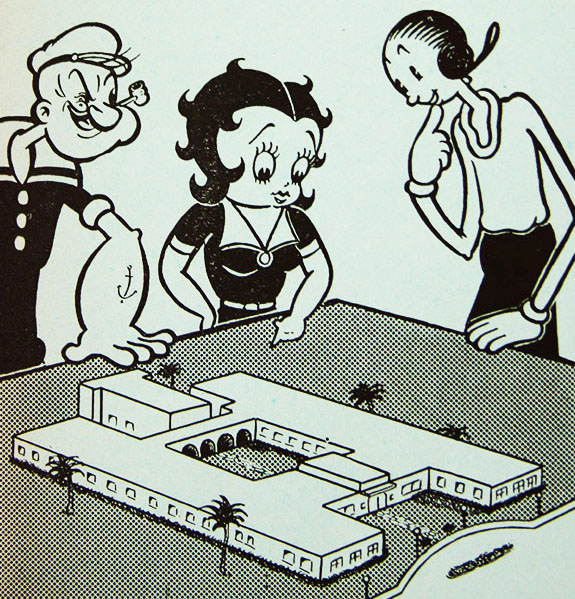
Fleischer Studios was entering an important transitional phase and the Paramount Sales News cartoons actually advertised it. Most noteworthy is the April 6th panel (above) showing a model of “the new studio”‘Uncle Max’ is building for us in Florida!” Of course, no mention of the looming feature – yet.
There was also the realization, reflected here, that the Fleischers had very few successful original characters despite their popularity. They branched out this season with Goonland, but even though they groomed Poopdeck Pappy into the quintessential asshole father, King Features still owned him. New original characters simply didn’t catch on, and they’re all featured in this installment: Hunky and Spunky, Buzzy Boop, and (legendary cartoonist Stephen DeStefano’s all-time favorite), Sally Swing.
March-April 1938 (click images to enlarge)
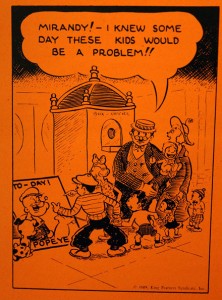
Directly above and below are a few samples of what cartoon shorts the Paramount salesmen were pushing to theaters at the time these promotional pieces appeared in print. Coincidentally these two happen to be a pair of the most politically incorrect subjects the studio ever released.
Above: Out Of The Inkwell (released April 22nd, 1938); Below: Big Chief Ugh-Amugh-Ugh (released April 25th, 1938)


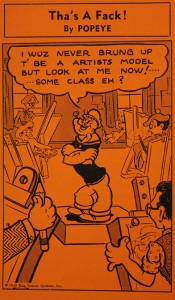
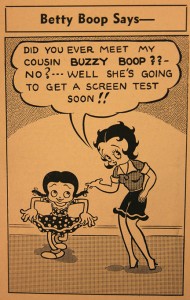
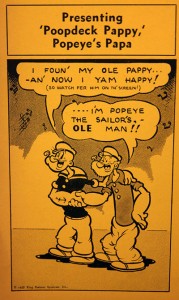
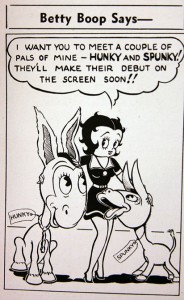
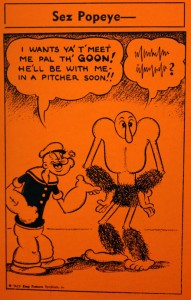

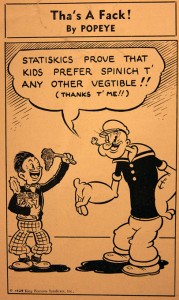
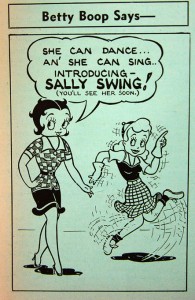
 THAD KOMOROWSKI is a writer, journalist, film restorationist and author of the acclaimed (and recently revised) Sick Little Monkeys: The Unauthorized Ren & Stimpy Story. He blogs at
THAD KOMOROWSKI is a writer, journalist, film restorationist and author of the acclaimed (and recently revised) Sick Little Monkeys: The Unauthorized Ren & Stimpy Story. He blogs at 
























































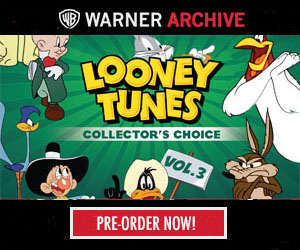
Why didn’t you embed a YouTube video of “Hunky and Spunky”?
Because, as stated above, we post a pair of embeds of shorts in release at the time these Paramount Sales News pieces were were printed. This week’s cartoons were released in April 1938. The first Hunky and Spunky short was released in June 1938.
Tommy José Stathes like this.
Betty’s comic panels also seem to have come to the realization that calling Ms. Boop box office old in the trade paper isn’t going to fool the Paramount theater owners anymore, so she’s used here more to tell them “The quality of my solo shorts and the ones with Pudgy may not be making audiences happy, but help is on the way!” (Which didn’t work out, either, even though some of the musical cartoons Betty was in from 1938-39, including “Sally Swing” are actually pretty decent).
Seems that way. They already seemed to be doing that with the Betty Boops for a few years prior, but these ads also suggest some desperate sweat among studio in that they can’t solely rely on their tentpole franchises any longer.
I love these! Thanks so much for posting them!
Thank you for NOT embedding a Hunky & Spunky short!
Coincidentally these two happen to be a pair of the most politically incorrect subjects the studio ever released.
This is my first time seeing “Out of the Inkwell” and it certainly took me for a surprise (interesting they would give it this title at all after having done series of this type 20 years before). Kinda reminded of having watched Walter Lantz’s “Voodoo in Harlem”, while I suppose a bit forgiving given it’s approach to music, we have to end it on a black cleaning women who annoying picks paper up from on the ground, perhaps thinking in the back of her mind what had those guys been doing last night and not getting paid enough for this.
The biggest issue by far that I had with the ’38 Out of the Inkwell cartoon is that dreadful dubbing they gave the janitor. Maybe it was post-syncing issue, but it wouldn’t have nearly been as bad had they actually let the actor, whoever he was, speak in his own voice.
The biggest issue by far that I had with the ’38 Out of the Inkwell cartoon is that dreadful dubbing they gave the janitor. Maybe it was post-syncing issue, but it wouldn’t have nearly been as bad had they actually let the actor, whoever he was, speak in his own voice.
It would’ve been nice, at least once they went to Florida they had to get their act together on ‘moving those lips’.
Not having orriginal characters meant the studio wasn’t participating in the merchandising revenue from licensing. Western Publishing also mostly used existing properties and the lack of that revenie stream was a problem as sales industrywide declined in the 1970s.
Forgive the typos!
Agree about Hunky and Spunky! Please put off posting them for as long as you like.
Aw, I like the way Hunky and Spunky laugh. And their big teeth.
I hate Hunky & Spunky.
Some of the gags are a nice throwback to the type of surrealism that permeated the studio’s early ’30s work. However, it would’ve been nice and funnier if Max himself was featured.